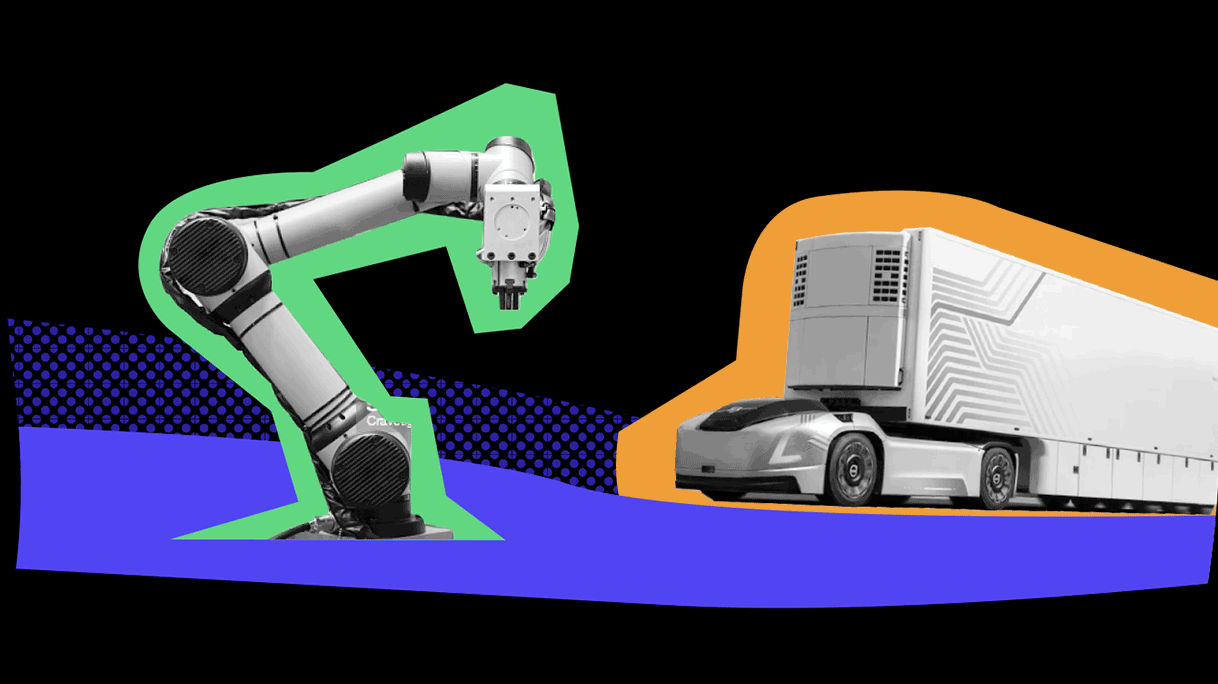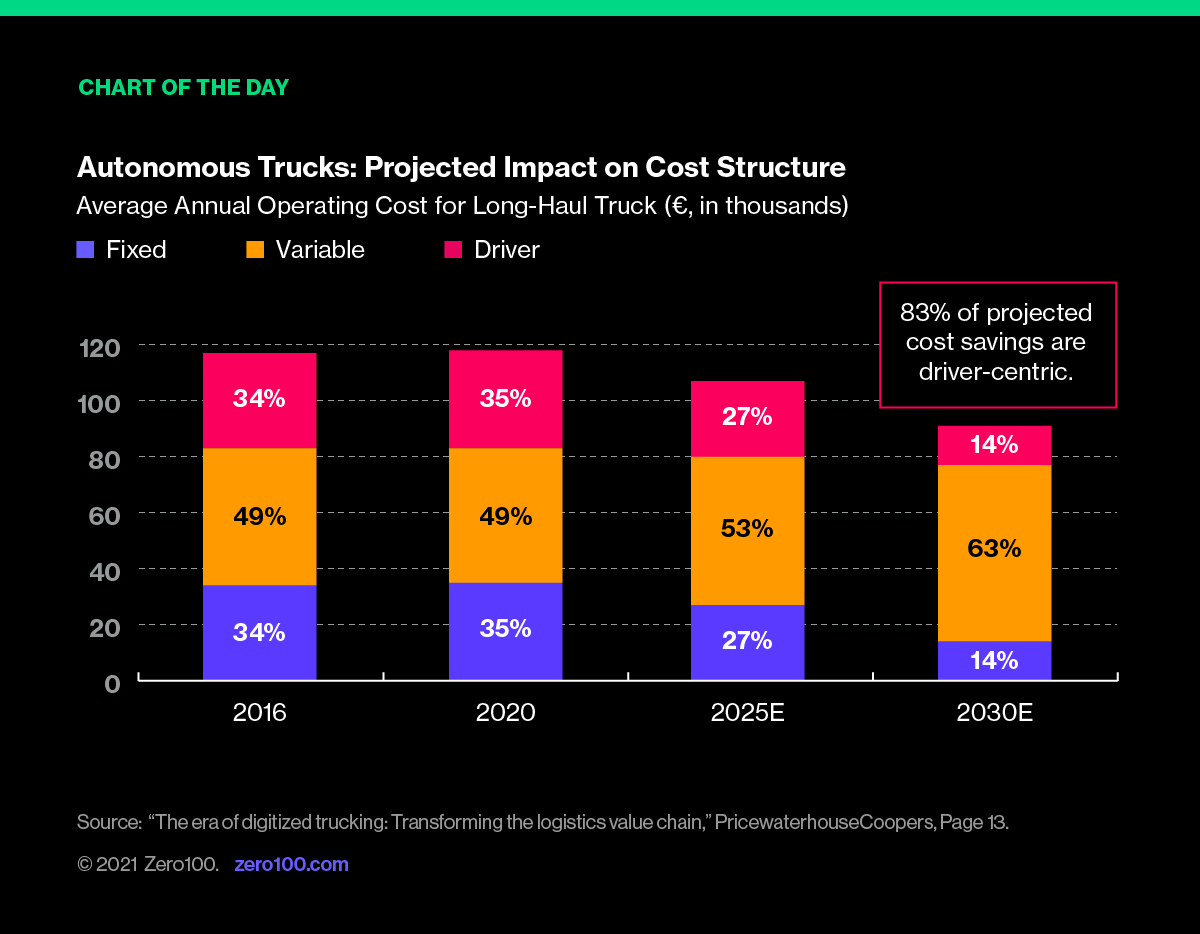
Three Hot Tech Ideas to Create Better Jobs
Three emerging tech trends—autonomous vehicles, uberization for manufacturing, and machine learning for logistics—are poised to challenge the status quo and establish opportunities for supply chain workers.
Robots aren't stealing jobs.
Robots, and the whole mega-wave of digitization in supply chains, are instead turning tough, hard to fill jobs into satisfying careers. Capital investment in things like machinery and information systems supports higher pay by driving up labor productivity. Repetitive work is automated off the payroll, leaving jobs that require the infinitely plastic human mind to learn, solve problems and grow.
Here are three examples of digitization taking the lousy work out so-so jobs:
Old Job 1: Long-haul Truck Driver.
Its lonely, dangerous, and since de-regulation, not very highly paid. The perpetual “driver shortage” should be a clear sign that this is not a great job, especially for the independent owner-operator who doesn't get paid to sit around waiting to load or unload.
New tech: Autonomous vehicles.
They're on the road now in Arizona, Texas and Florida and estimated to save 30% per mile compared to human drivers. There are still plenty of technical issues to work out but given the roll out of 5G networks and advances in machine vision and artificial intelligence, it is clear they are coming to our highways.
New job: Local Loopers.
Less-than-truckload (LTL) and last mile parcel delivery are booming thanks to huge e-commerce volumes. Drivers handling these routes can not only go home every night, but also develop relationships and knowledge that is valuable to customers. Higher pay funded by long-haul savings, if complemented with higher drop-density and route affinity could turn your local loop driver into a smiling, problem-solving extension of your brand promise.

Old Job 2: Metal worker in an under-utilized machine shop
Imagine a small, depressed fabrication business in Manchester, England. The Dickensian vibe and grim anxiety bred where fear of redundancy drowns out any residual joy attached to craftsmanship paints a less than rosy picture. Amplified by the isolation of Brexit, this old job doesn't sound great.
New tech: Uberization for manufacturing.
Fractory, a start-up founded in tech-savvy Estonia, but moved to industrial-chic Manchester, just landed $9M in series A funding. This money will help the company scale a business that runs a tech platform to match customers in construction, aerospace and the like to metal shops for custom fabrication jobs. Hundreds of small fabricators have already done work for some 24,000 customers already, exchanging CAD models and process instructions to streamline the work.
New job: Artisanal Steelsmith.
Fractory's market-making for skills, machinery, and shop capacity in an industry that often has equipment utilization rates of 50% or lower is more than just good AirBnB-type economics. It is also a way to give talented craftspeople a rewarding, secure career path by letting them do a wider variety of jobs for many different customers, earning and learning more along the way.
Old job 3: Answering shippers' #1 question: “where is my stuff???”
COVID has laid bare the problems in our extended global supply chain as containers from Asia have been delayed, re-routed, or just plain lost too many times count in the past year. Poor information about where exactly my stuff is (on a ship? waiting outside the port? in the yard? on the road?) is endemic. Taking the heat for this mess is most certainly a tough job.
New tech: Machine Learning for Logistics Tracking.
Container location tracking is nowhere near the standard we've come to expect from our GPS-enabled smartphones. Rather, it is a mashup of separate systems that track promises, departures, arrivals, and changes. Enter Portcast, a Singapore-based startup that digests data from hundreds of geospatial, satellite and port log data sources to generate accurate container location information even at sea.
New job: Container Cruise Director.
With Portcast, logistics directors could offer customers late-stage flexibility as delivery due dates approach. Change your mind about where you want your stuff delivered? Let's see what we can do. Trouble at sea? We'll let you know and figure out what can be done. The difference between blind bearer of bad news and helpful problem solver is huge.
Carbon Kickers.
These new jobs sound better, but there's more! Autonomous vehicles will accelerate fleet electrification. Uberization of manufacturing will help localize parts sourcing. ML for logistics will help optimize fuel use.
Bring on the robots!
Critical Reading
TIME
Why is Everything More Expensive Right Now? Let this Stuffed Giraffe Explain
Commentary: Excellent breakdown of how manufacturers are using supply chain uncertainty to bake in a bigger profit ‘cushion' to the overall cost of goods experiencing skyrocketing shipping costs. We used to call this profiteering...
#infographics #inflation #holidayQ4
BLOOMBERG
Forget Finance. Supply Chain Management is the Pandemic Era's Must-Have MBA Degree
Commentary: Preach brother, but is the path out of our present dilemma more visibility across the C-Suite? Or can we attack the labor shortage from both ends of the spectrum?
#trending #emergingtalent
SUPPLY CHAIN MANAGEMENT REVIEW
Need Supply Chain Staff? Hire Gamers
Commentary: On January 1942, Bletchley Park placed a crossword puzzle in The Telegraph to covertly recruit untapped talent (i.e., puzzle solvers) to the war-winning Enigma project. Hmm...
#emergingtalent #thinkdifferent